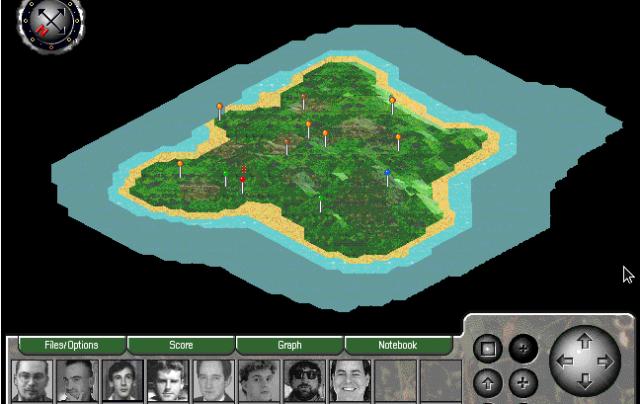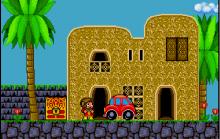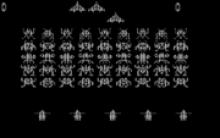SimIsle: Missions in the Rainforest
How to play SimIsle: Missions in the Rainforest
Each game uses different controls, Games can a combination of mouse,keyboard and Joystick.
SimIsle: Missions in the Rainforest Description
SimIsle: Missions in the Rainforest is a construction and management simulation game published by Maxis in 1995. It ranks among many relatively unsuccessful "Sim games" (from a sales view point) that Maxis produced in the 1990s between the various incarnations of SimCity. Like these dozen or so others, Maxis referred to the title not as a video game but as a "software toy" because it remained faithful to the open ended philosophy of the company.
Before a new game can begin, the game requires that the player choose one of several dozen fictional tropical islands of various shapes and sizes to simulate. Each island is unique in that it has varying amounts of open plains, forests, mountains, natural resources, and native peoples. The amount of pre-developed land also varies but most of the islands are largely nondeveloped when a new simulation begins. Although each scenario has certain objectives and win/lose conditions, the scenario objectives are always optional (each map can be started with the scenario objectives turned off) and the simulation can continue in free form even after successfully completing the initial task.
The game engine itself has a passing similarity to that of SimCity 2000 (SC2K). For example, the island maps are projected isometrically; however, the terrain graphics are more sophisticated and other graphics are of a slightly different style than SC2K. Another engine similarity is the ability to rotate the map 90° at a time, which allows it to be viewed from four different perspectives. There are also three separate zoom levels, ranging from very far out, allowing the entire map to be visible on screen, to very close in, for viewing very specific details of the island.
Each island map has its own initial situation or quagmire that the player can deal with however one sees fit. Of particular note is the scenario where the island's natives have begun growing narcotics and a foreign drug cartel begins operations there as a result. The player can choose to ignore the situation, take a cut of profits or send an agent to shut the operation down. If the player makes an agreement with the drug cartel, one receives a portion of funds deposited in their treasury but receive an unfavorable world opinion. Choosing the last option can, however, result in the assassination of said agent.
In similar Maxis titles, player actions, such as placing buildings, are completed instantaneously and totally anonymously. This makes SimIsle somewhat unique in the Sim world because it is played through the use of intermediary agents who are both hired and paid by the player. Collectively, the agents, who have varying skills and profiles, will carry out all of the players actions in the simulation and will take varying amounts of time to complete each project.
The agents are managed through a special building that appears on every map known simply as the Agent HQ (although it can be renamed). Each isle comes with a number of pre-selected agents and others can be hired using the Agent HQ facility. Additionally, agents on the payroll can be fired or trained while they are stationed at the Agent HQ. Each agent usually has two skills (such as Construction, Flora and Forestry, Local Culture, or even Criminal Contacts) that allows him or her to take on certain assignments. In some situations, an assignment requires more than one skill; if a single agent doesn't have all the necessary talents two or more agents can be used to finish the task. It's not possible to train the agents in new skills but they can be trained to increase the effectiveness of the skills they already have.
An agent's skill set also determines where the agent is allowed to move on the map. All agents can move to existing facilities and settlements but others are not allowed to move onto nondeveloped tiles. For example, agents with the construction skill are allowed to move most anywhere on the map so that they can start new building projects. Agents with the "Exploration" skill are allowed to move onto jungle squares and may discover hidden objects in doing so. Trying to move an agent to a location he is not eligible for simply results in an error message to that effect.
Most Sim titles require some form of resource management which is usually currency of one type or another. SimIsle has its own currency, known as the "EMU", but this is only one of the many resources available on an isle. Each island has varying deposits of natural resources such as lumber, coal, gold, iron, and oil which can be gathered by building an appropriate facility (such as a mine, logging camp, or oil rig) on a tile which contains the resource. Once the facility is built, it operates more or less autonomously and will produce the specified resource at a rate determined by various factors including the richness of the deposit in that area.
Two other important resources are food and unskilled labor, both of which are supplied by the native villages that are dotted across each island. Initially, the native villages have low populations and are only capable of producing enough food to support the lone settlement. Agents with the appropriate skills can be sent to the villages to train them which increases their ability to produce food. This, in turn, allows the village population to increase which can then be used to found new villages (to further increase food supply) or act as an unskilled labor pool.
The surplus food produced by well trained villages can be used to support populations in towns and cities (which are built by the player) which can then be used to obtained anskilled labor. Additionally, the native population has a happiness level that can be adversely affected by environmental conditions or by drawing too many unskilled laborers. Unhappy villages will sometimes start growing narcotics, as mentioned previously, which can be exploited for profit using an agent with the Criminal Contacts skill.
Most natural resources require unskilled labor to extract them so usually the first thing the player will do in a new simulation is establish an unskilled labor pool. Once that is completed facilities can be produced to extract the raw materials from the environment. Other facilities can then be built to produce lower-end goods that can be sold for profit, used in cities or used as part of the supply line in building higher end goods. The various facilities in this supply chain (except for labor sources, although cities must be connected to factories and warehouses to purchase goods from them) are connected by roads built automatically by the simulation.
An AI manages what resources are distributed where and one of the challenges of the game is balancing supply with demand. In most cases, it is also possible to simply buy equipment and goods needed to jumpstart production or build new facilities, but this is not recommended for the long haul since it is expensive and must be performed manually by the player. Idle facilities that are starved because resources are not distributed to them or simply because none are available can become quite costly. Most resource deposits do not provide infinite supplies and so can be exhausted with time, which means most supply chains can not function without player interaction forever nor can a single simulation indefinitely support heavy industry.
Another interesting resource in the game which proves to be reasonably lucrative and enduring is tourists. Various facilities can be created that bring tourists to the island such as airports and ferries, and they act in a manner similar to other resource sources like mines (although the "used up" tourists are returned then, unlike mines). The next facility in the tourism supply line is tourist accommodations which can be upgraded both in size and quality and produce income. From there tourists will visit tourist attractions that can both be built and also discovered in the jungles by using an Agent with the exploration skill. Attractions not built by the player will often have to be opened to the public explicitly by the player and then upgraded before they become effective in drawing tourists and producing income.
In one scenario in particular (and even rarely in others) it is possible to find a hidden agent who is a cartoon super hero named Captain Sprout. There is a side story to the game involving Captain Sprout and his battle with his arch-nemesis. Captain Sprout is unique in that he has 6 skills (where the standard agent only has 2) and his starting skill level in each is 99 (where all the other agents start at 50 but can be trained higher).

SimIsle: Missions in the Rainforest - additional information
















